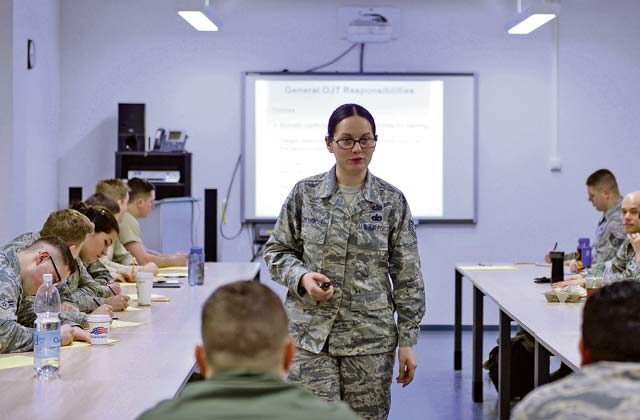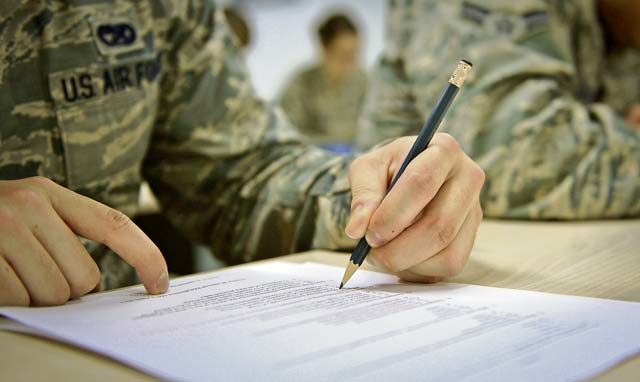
In order for a mission to be successful, all must know what they are doing — and do it well.
From major commands all the way down to the smallest flight, training is vital to every Air Force mission.
Unit training managers are the Airmen responsible for managing the training program of their unit.
“UTMs are the subject matter experts when it comes to training,” said Tech. Sgt. Christine D. Berrios, 721st Aerial Port Squadron UTM. “I believe we play an integral part in completing the Air Force mission because we serve as the focal point for all training related matters in the unit. As we all know, training lays the foundation for mission readiness.
“Without an established or well-maintained training program, unit mission readiness could be adversely affected,” Berrios added.
A UTM provides training-related assistance to supervisors, trainers and trainees. The assistance includes scheduling formal training classes, showing supervisors and trainers how to conduct and document training, managing on-the-job and ancillary training programs for commanders, and advising commanders and supervisors at all levels on how to effectively operate their work center training.
UTMs are also in charge of conducting the Air Force Training Course. The AFTC is a course that trains unit training managers and covers topics such as the training business area, upgrade and qualification training, skill level progression and the how to conduct training and certification.
“The list could go on,” Berrios said. “Throughout my three years as a UTM, I’ve come to understand that anything tagged with training we are involved with in some way.”
What makes a UTM’s job unique is that it can either be a career in itself or an additional duty.
“UTM is one of the few jobs in the U.S. Air Force that can either be an Air Force specialty code or an additional duty, depending on your unit’s manning documents,” said Master Sgt. Guy A. Madsen, 86th Vehicle Readiness Squadron unit education and training manager.
Madsen and Berrios, who are both UTMs by career field, acknowledged that there are challenges and rewards in their job.
One of the struggles of a UTM is making sure Airmen do not fall behind in their training and certification, which may be a challenge in a unit with a hectic mission tempo. Madsen lamented the issue of training taking a backseat in units with especially busy schedules.
“You can get very distracted by the operational mission in your squadron,” Madsen said. “Whether it’s working in the dining facility or putting jets in the air … the leadership focus is to get that mission done. The quality of work can erode very quickly if you don’t have a training focus.”
Despite challenges common to her career field, Berrios still enjoys her job, saying there are many benefits a UTM can reap if they can just look over the hurdles.
“One of my favorite aspects of the job are the people I work with. They have helped me grow not only as an NCO, but as a UTM,” Berrios said. “I love learning new things and being a UTM. Learning will never stop. I do not think I have any not-so-favorite aspects. Just like any job, it has its ups and downs, but ultimately, I wouldn’t change what I do for anything.”
While Berrios, Madsen and many other UTMs are scattered across Ramstein’s network of squadrons, they have one mission in common: to invest in Ramstein’s Airmen and lay the foundation for the Air Force’s excellence.



